#How Much Did The Lawyers Get In The Erin Brockovich Case?
Photo

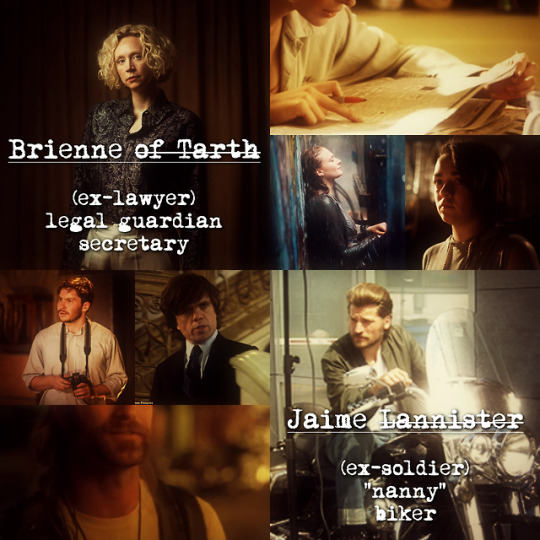
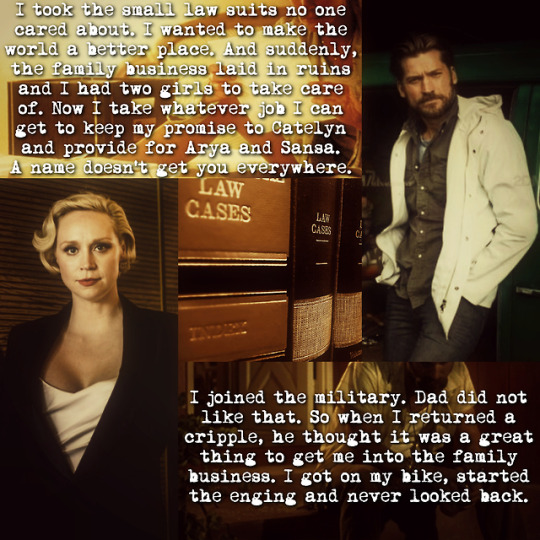
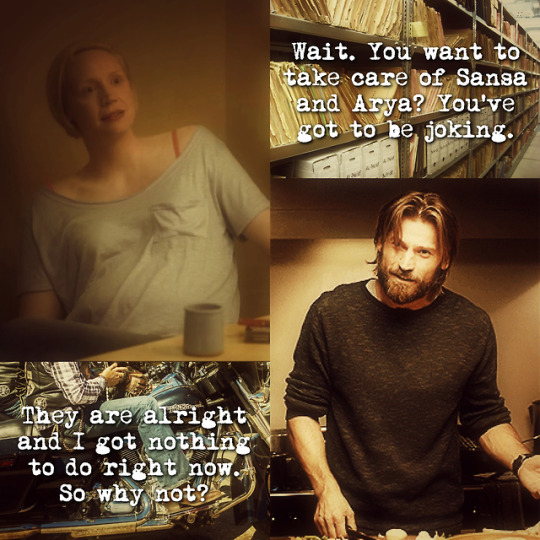
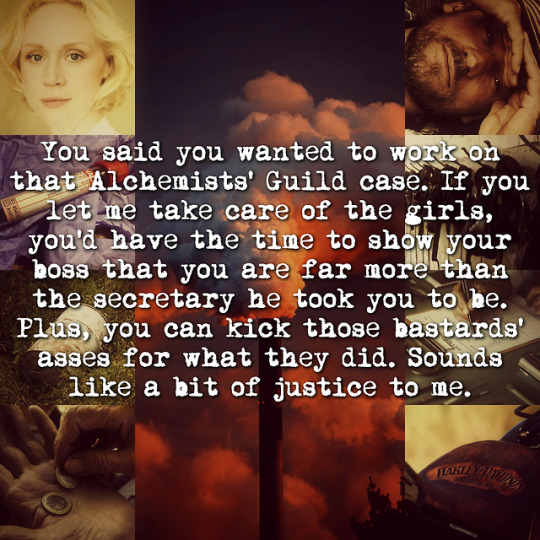
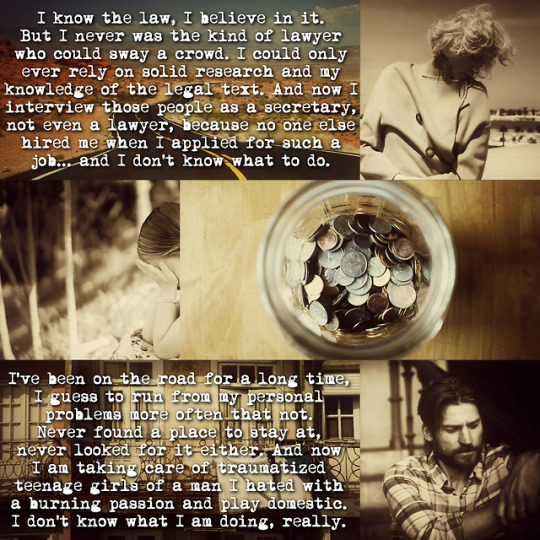
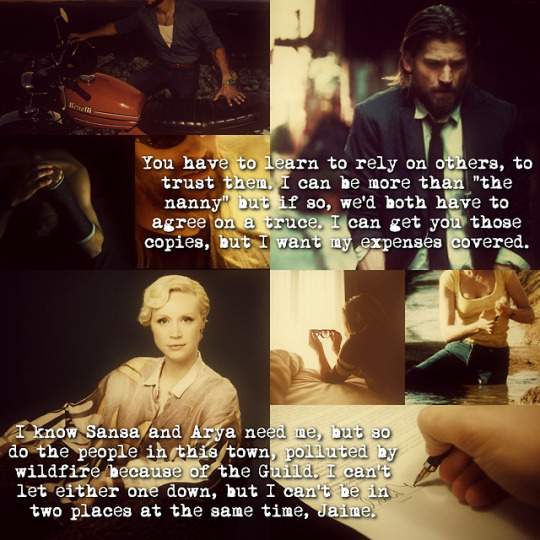
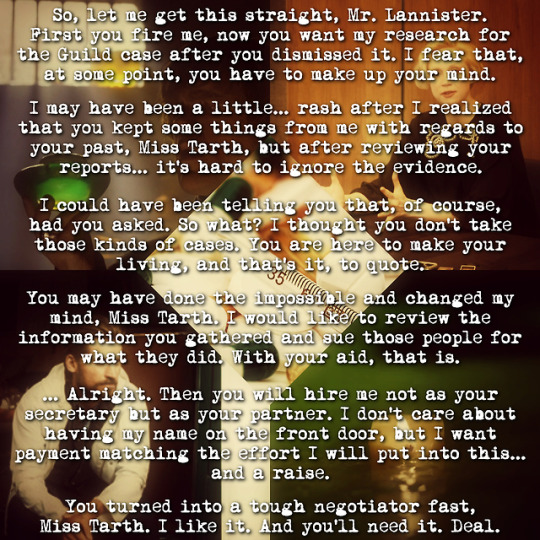

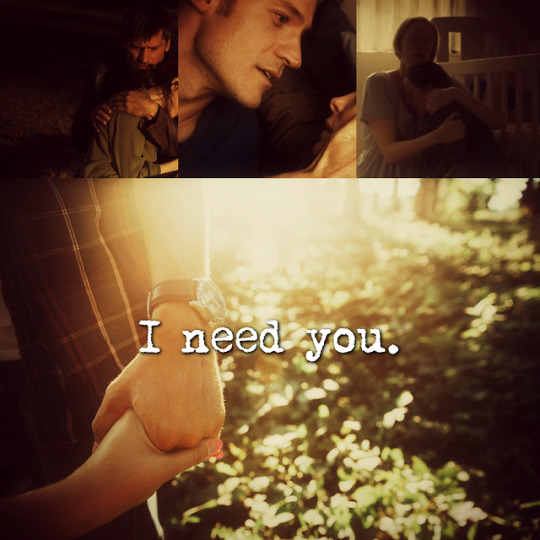
Moodboard: Jaime x Brienne - Erin Brockovich AU
To send this ahead... I know that Brienne’s character is much different from that of Erin in the movie, but by giving some over to Jaime and twisting and shredding things, I found it a very intriguing plot bunny! :D
Brienne doesn’t have it easy lately. Just recently she had to move into a new, shabby house on the outer outskirt of King’s Landing. She can no longer afford her old apartment in King’s Landing after she was fired from her secretary job because she had to take off to take care for her foster children Arya and Sansa and the boss showed little understanding for a single parent taking care of two traumatized girls. And now she stands there with bills to pay and no one willing to hire her.
Sometimes she really wished Catelyn had chosen any other person to take care of her girls in case of her demise, but as things stand, there was no other way. Bran and Rickon are with Osha and Luwin whereas Jon could not possibly take care of his siblings as he was drafted for service at the Wall. Brienne wants to honor that vow since Cat helped her a great deal in the past, but she feels all the more like failing as she cannot provide for the girls what they would deserve after the losses they had to suffer: their parents, oldest brother, his wife, and their home in Winterfell.
However, Brienne won’t let this stop her, so she goes through advertisements and calls any office offering jobs in the hope to find something new. She applies for a job as a secretary in Tyrion Lannister’s law firm, a small thing that mostly runs itself as far as she can judge. Brienne is little impressed when she meets the boss, because Tyrion Lannister does not strike her as a passionate lawyer. Instead, he spends his time looking after women to check them out and drink from his flask hidden under the table.
Brienne applies not as “Brienne of Tarth” but “Brienne of Morne,” her mother’s maiden name. She would rather not, but whenever she applied for jobs she was linked to her father’s ruined company and her failure to ever become a top lawyer due to personal choices she made in the past. She applied for jobs in law firms as a lawyer again and again because she went to the best schools, had excellent grades, but her past continues to haunt her. She is either overqualified, they tell her, or she doesn't have enough courtroom experience, or they think she is a failure because her father's firm went downhill without her being able to stop it. Thus, she writes applications below her profile, leaves out most of her personal past and just hopes to finally get a steady job to provide for Sansa and Arya. She is desperate.
Tyrion is hesitant at first, arguing that he normally looks for "prettier" secretaries, but he has to give in eventually because Brienne won't budge and proves that she can do the job better than any of the other applicants.
Sansa and Arya give her trouble too, Arya gets into fights at school whereas Sansa won’t stick to Brienne’s rules, stay out late and leave her guessing to where the girl is headed.
So no, things are not easy on Brienne, but she won’t let that wear her down as she, at the very least, finally got a job at the law firm to cover the costs. She works her ass off at the office until she stumbles over what seems to be a small case involving selling property to a big chemical industry called The Alchemists' Guild, a business that focused on wildfire and its derivatives. They want to buy properties close to their plant on the outskirt of King's Landing, in a very poor area not that different from the one where Brienne now lives with her girls.
Brienne asks Tyrion if she can look into the case, after all, she can tell something is odd with the numbers due to her experiences she did not list for her application. He handwaves her proposal, much more concerned with his pretty new “intern” Shae.
Fueled by her wish to finally do something close to her past in the law, Brienne heads down the dusty roads to meet the people The Alchemists' Guild wants to purchase the properties from. While most won’t speak to her at first as Brienne doesn't think she has it in her to make people listen to her, the young woman is surprised when people start to tell their stories. Sooner rather than later, they trust her because she listens to them and gives them the facts rather than what they call “lawyer talk”. Brienne continues to gather information, doing what she is accustomed to as a former lawyer: she talks to experts, puts together evidence, and essentially starts to build a case she has any intention to present to Tyrion once she made certain that she is onto something.
Back home, things don't look as bright, however. Her nanny quits on a whim, leaving Brienne with no one to pick up the girls, make them dinner and the like until she gets home. It gets so bad that one day, the woman she hired to look after Sansa and Arya just doesn't show up and leaves the girls to walk home all by themselves. She is in a panic until she finds them with the recently moved-in and to her mind totally annoying one-handed biker-wannabe Jaime. He has barbecue with them and particularly Arya seems to like the guy who insists on only being referred to by his first name. Ever since he said he took fencing lessons in his youth and would have no trouble teaching her the basics, the girl is sold on the wannabe-biker. Jaime and she thus suggest to Brienne that she should hire him as the new nanny.
Brienne doesn’t know what to do with all this because a man looking like this, acting like this, making lewd comments all the while supposedly being good with teenage girls? How does that fit? The two eventually agree that he gets a shot at taking care of the girls in exchange for a bit of extra money. Jaime says he can use it because with just one hand, working on the construction sites became difficult and the gigs are scarcer around this season.
And so, a truce is born.
Brienne continues her investigation and puts in all of her efforts as she grows increasingly aware of the sheer importance this case has to the people involved. She starts to piece together that the The Alchemists' Guild tries to cover up literal dirty business, relating to people around the area getting sick in large numbers and their usage of wildfire. Brienne suspects a pattern behind this and figures that there must be a connection between the water supply for the town and the plant.
Thus, Brienne wants to request the records to obtain copies. However, the lady sitting at the front desk of the archive won’t let her in. Brienne suspects that she is in cahoots together with The Alchemists' Guild. Brienne fails to charm her way into the archives, that’s never been her strong suit, which is why she heads back to the house feeling like an utter failure.
Back home, she sees that Sansa and Arya really take a liking to Jaime, who runs the house just fine, if a bit unconventionally. When Jaime sees Brienne drag herself into the house, looking like someone just took her favorite medieval sword fighting film away, he wants to know what's wrong with her. She won’t admit at first, after all, Brienne hates to show weakness, but Jaime won’t budge and continues to poke her for information until she gives in and admits that she failed today.
“The downsides of being as ugly as a mare: I can't charm my way into the archive,” Brienne sighs.
“You can be charming in your own way if you try.”
“Shut up. And anyway, it's a lady.”
“Doesn't mean you could not put on a flirty face. Maybe she's looking for a bit of an adventure after all. I don’t judge.”
She rolls her eyes. “I never should have told you.”
“Fine, fine, I stop. I stop,” he laughs. “But I may have a solution.”
“Which is?”
Jaime points at himself with a smug grin. “Me.”
“You are the solution how? No offense, but you don't inspire... confidence in your legal status, shall I say?” Brienne scoffs.
“You said it. It's about flirting. And I am really good at that.”
“Are you? I did not notice.”
“Because I have no intention of flirting with you. I am your employee after all. If you properly compensate me, though, I can do expand my services, only just for you, wench.”
“Compensate you.”
“Well, you will have to give me a bit of a starter to set things up. For that, you get all the copies you want so desperately.”
“You are supposed to take care of Sansa and Arya. That’s what the truce is about, remember?”
“And they will be gone for a whole week for that school trip, remember?”
“... I forgot.” Brienne grimaces. It rubs her in the wrong way that Jaime already handles things so well that she finds herself forgetting things she wouldn’t have, but the job consumes so much of her time that she doesn’t know what to do with herself.
“Thought so,” Jaime chuckles. “So I got nothing to do anyway. Give me fifty stags and I will get you those copies tomorrow after we dropped the girls off. Deal?”
“... What's the worst that can happen, huh?”
Brienne is to find out the next day, remaining rather irritated by Jaime’s cryptic messages who says he will meet her outside the archive and that she is supposed to wait for the “big show.” She doesn't know what to expect until a very suave looking Jaime walks up to her, dressed in nice clothes, his hair in a neat bun, beard trimmed, stump securely hidden away in his fancy jacket, looking nothing like the biker she got to know and yelled at the first time she met him.
Jaime is having his dear fun at Brienne’s ogling at him before proceeding inside and charming the lady into giving him access to the archives. Jaime pretends to be an “intern” working for some “nasty lady” who only ever treats him badly.
“She yells at me and only ever bosses me around. Can you imagine?”
“Oh, trust me, I can.”
Brienne is bound to wait until Jaime re-emerges with the promised copies, looking like he just won the lottery. Brienne almost feels tempted to hug him, but just almost. Jaime is feeling pretty ecstatic at her blushing and evidently checking him out. He tells Brienne she can request his services again any time she needs it.
“Though next time, you may have to take me out for dinner afterwards.”
“… We’ll have to see about that.”
Brienne finally feels a bit vindication when she comes to the office, ready to present her findings to Tyrion, but that hope is instantly crushed when she finds her desk cleaned, stuffed into a box, and the other employees looking at her with nothing but misgiving. When she demands to know what is going on, Tyrion calls her to his office to inform her that he can’t keep a secretary who doesn’t come to work, seemingly having forgotten that she told him she wanted to investigate this case, and to top it all, he does not appreciate that she lied about her identity. He reveals to her that he did some research on his own and figured out that she is actually the “infamous” Brienne of Tarth.
Brienne is enraged because he dug through her past without her consent, looking at what she tried to bury, all of that pain that cost her so very much, not just the family company, not just her reputation as a lawyer, but also her father who died shortly after he had to file for bankruptcy due to business partners making bad investments on his behalf. She storms out of the building, furious but also desperate because she just lost her source of income.
Back home, Jaime is fixing things around the house to the best of his abilities. Brienne loses her cool a last because she can't afford to pay him anymore, she can't do anything right.
“Everything I touch, it just breaks apart.”
She confesses to Jaime at last what went on in her past, tells him all about her father’s failing business, how her father didn’t involve her in the business until it was too late because he wanted to give her the freedom to follow her personal mission of defending those people in court who couldn’t defend themselves. She tells Jaime all about her father’s death, and how that left her with massive debts to pay, but despite her experience and education, she was forced into taking small jobs, hide herself, because she never made more out of herself when she still could.
“And now I am not just failing myself, I am failing Sansa and Arya. Seven Hells, I am even failing you. I am failing everyone!”
To her great shock, she finds herself in the arms of the man she has a truce with. Jaime comforts her and holds her close when her world is on the verge of falling apart. And for the first time in a long time, she simply lets go, allows herself to accept that comfort, to let someone else hold her when she is so used to keeping it together for others.
Jaime trusts her with some of his past at last, something she never demanded of him to know, how he lost his hand during his time in the military and returned a war veteran with trauma but no family to support him when it mattered. His father just wanted him to join the family company and his sister could not care less about him as she was too absorbed into her own affairs. Even his little brother, who used to look up to him, wasn’t there for him when it mattered. Jaime only ever found joy in riding his motorbike and eventually he was so fed up with the family that he could not take it anymore and simply started to drive, never looking back.
One thing leads to another and the two fall into each other’s arms and into the bed. And for a time, things seem fine again, however broken, because Jaime is all the things Brienne wouldn’t have thought him to be when they first met. He is soft and caring as well as witty and snarky. And Jaime finds that with Brienne, he can finally talk to someone who understands, who bothers to listen, who doesn’t look at him as a lesser man for the choices he made, for the hand he lost and the lifestyle he chose for himself. For the first time in a long time, neither one feels alone in this world.
Sometime later, Jaime takes the girls out for something fun to do so that Brienne has the house to herself and can make some phone calls to find a new job. Brienne is surprised when shortly thereafter, Tyrion winds up on her doorsteps. He says he read her report and finally understood that he was being “kind of a cock” for thinking she was taking time off without telling him and was indeed working this whole time as she had insisted.
“I just thought you were lying,” he admits.
“I don't, not when it comes to those things.”
“You lied about your name.”
“I put in my mother's name because whenever I applied with my own, no one would give me a chance. And I find that kind of unfair, wouldn’t you agree?”
“It is... So, can I come inside?”
“Under the condition that I will throw you out the moment on I am fed up.”
“I suppose I will have to agree to those terms, Miss Tarth.”
Tyrion and she sit down for a long overdue conversation about the case. Tyrion lets her know that he is now convinced that she is onto something big. He wants to work the case, with her, and have a look at the research she gathered but did not include in the report she left at the office before storming out.
Brienne, remembering Jaime's words about how she has to see more worth in herself, demands not just her job back, but to be accepted as who she is and what she is, lawyer Brienne of Tarth. And a raise. Tyrion likes the change of tone and agrees, telling her that he found a replacement anyway, in Shae.
“She does not know how to file reports, but she is good at making coffee.”
“I suppose that's not the only thing you see as being of merit.”
“Far from it.”
“Be it as it may... I have one more condition.”
“Which is?” he wants to know.
“If we go to court with this, if we really work this case, you will cut down on your alcohol consumption. I won't have a partner in on this case who sleeps under the office desk. The people I talked to, they matter to me, their lives depend on our success, and I won’t let someone in on the case who isn’t a hundred percent committed to the cause.”
“I am a very highly functioning alcoholic.”
“Cut it down or cut me out. Your choice.”
“You learn fast.”
“I may have a good teacher, though he still has to prove himself.”
Tyrion asks her to have another look at the archives because there must be more to what she currently has. Brienne says that she will have to ask her “friend” to do that, letting him know that she had no luck whereas her friend did. Tyrion is amused by the arrangement and jokes about how that sounds more like this “friend” is to her what Shae is to him. Tyrion suggests to her that he should meet that guy as well, to instruct him on what to look for. He has a greater knowledge regarding those matters than Brienne happens to have because he worked similar cases before. Brienne agrees to the arrangement.
That is the moment Jaime returns with the girls. Brienne tells him about the good news, only for him to go completely blank when he sees Tyrion and Tyrion sees him. Brienne doesn't know what's happening until both drop the bombshell that Jaime is Jaime Lannister and that this is his brother. Brienne never mentioned the name of the law firm to Jaime because he said he did not care.
As it turns out that the brothers were estranged after Tyrion took off to Essos to work for Daenerys Targaryen as a legal advisor when Jaime would have needed him most after the loss of his hand. When he made the cut away from Cersei and Tywin, Jaime thought Tyrion would stand by his side, but he did not. Instead, Tyrion rather kept out of the affairs and hid away in Essos. Jaime never forgave him that and broke with him the same way he did with the rest of the Lannister clan.
Jaime leaves the house in a hurry, unable to deal with his brother and his past catching up to him. Brienne goes after him and comforts him, to “return the favor.” While she won't ask him to go back to the archive and thus help his brother, Jaime says he will do it because he's seen what wildfire can do in the warzone under Aerys in particular, and he could not live with himself if he let people get away with using it.
“Just don't expect me to make peace with my brother.”
“I don't.”
“Then the truce remains intact.”
The work continues and the three work on their parts of the case. Brienne keeps gathering evidence and interviews to connect the dots, Tyrion preps up the battle tactic alongside her and gets back into his old game as the stellar figure he used to be in court despite his height, and Jaime ventures through the archives and on occasion charms his way into the hearts of the locals they have to interview when Brienne can't seem to get through to them.
However, big trouble is on the way and one set-back hunts the next. Running out of money, subtleties from the team of lawyers they are up against, files disappearing, threats, and unknown phone calls are only some of the problems they are facing.
The investigation starts to take its toll on Jaime’s and Brienne’s burgeoning relationship. Jaime doesn’t know whether he can commit to this kind of life he slipped into, after he embraced a life without strings attached for so very long. Brienne, for her part, can’t slow down and dedicates almost all of her time to he work. She would love to spend more time with Arya and Sansa, but she has a responsibility towards those people, she made a promise and has to keep it, has to, has to, has to. However, she also struggles with her feelings for Jaime because she doesn’t want to hold him back, well aware that he is still coming to terms with his PTSD he suffered in the war. She doesn’t want to burden him and doesn’t feel like she can make him stay. After all, she is not flirty, is not charming, and bad luck just keeps sticking to her flat heels.
And all of that happens in the midst of a legal war about to begin between The Alchemists' Guild and Brienne and her team.
But will they win?
Will justice win?
And what may be the costs of that battle?
Only time will show.
Additional Image Source: Erin Brockovich (2000).
#jaime x brienne#jaime lannister#brienne of tarth#game of thrones#got moodboard#got aesthetic#moodboard#aestheic#wacky tries gimp#fanfic#in smol#wacky writes fanfic#erin is evidently very much unlike Brienne in character#but I found the story totally intriguing#and with a bit of a change-up we can actually make it work I believe#at least I like it
125 notes
·
View notes
Text
Peter O’Toole Blog Hot Artwork(Pics) Netflix Mature Sizes Weight Affairs
Peter O’Toole Blog Hot Artwork(Pics) Netflix Mature Sizes Weight Affairs
You Can Search PETER O’TOOLE UNDERPANTS SIZE CHEST SIZE MUSCLE SIZE OR ENDORSEMENTS, KATE O’TOOLE UNDERPANTS SIZE CHEST SIZE MUSCLE SIZE OR ENDORSEMENTS, LORCAN O’TOOLE UNDERPANTS SIZE CHEST SIZE MUSCLE SIZE OR ENDORSEMENTS, PETER O’TOOLE HIDDEN HOT SCENES WHY DELETED IN HARRY POTTER, KAREN BROWN PETER O’TOOLE HIDDEN HOT IMAGES, PETER O’TOOLE HOTX AND ROMANTIC MOVIES AND TV SHOWS LIST, PETER…
View On WordPress
#Are Domhnall Gleeson And Brendan Gleeson Related?#How Long Is Lawrence Of Arabia Film?#How Many Characters Did Warwick Davis Play In The Harry Potter Movies?#How Many Different Actors Have Played Dumbledore?#How Many Times Was Peter O Toole Nominated For An Oscar?#How Much Did The Lawyers Get In The Erin Brockovich Case?#How Much Is Sir Alec Guinness Worth?#How Much Money Was Peter O Toole Worth?#How Old Is Actor Albert Finney?#How Old Is Bjorn?#How Old Is Joan Plowright?#How Old Is The Actor Christopher Plummer?#How Old Was Alec Guinness When He Played Obi Wan?#How Old Was Alec Guinness When He Was In Star Wars?#How Old Was Gregory Peck When He Was In Roman Holiday?#How Old Was Laurence Olivier When He Died?#How Old Was Richard Harris When He Passed Away?#How Old Was Vivien Leigh When She Starred In Gone With The Wind?#How Tall Is Bjorn?#Is Brendan Gleeson Married?#Is Dumbledore In Gladiator?#Is Ed Masry Still Alive?#Is George Savalas Telly Savalas Brother?#Is Joan Plowright Still Alive?#Is Michael Gambon Still Alive?#Is Omar Sharif Dead Or Alive?#Is Peter O Toole Dead?#Is Peter O Toole Still Alive?#Is Richard Harris Still Alive?#Is Sir Michael Gambon Dead?
0 notes
Text
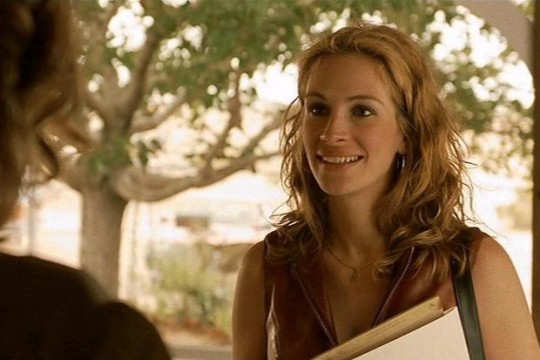
Erin Brockovich (2000) dir. Steven Soderbergh.
7.9/10
That man from Orange is the New Black.
This is so crazy. She did all this when no one asked her to and she just did it. She went all the miles. That’s so crazy to me that she did that. Imagine a world when we did things like this. Imagine if we all went all the miles.
Charles was creepy tho ngl.
I love love love when we are more capable than we appear and show people up and shut them up.
I can’t believe corporations just do this shit to the world and I hate the evil that exists in this world. Look at the contrast of Erin and the corporations.
Spoiler: [About Erin Brockovich. She’s twice divorced, is a single mother to 3 children, and is unemployed. A car hits her one day and she sues after getting hurt. Ed Masry is her lawyer and they lose because of her bad behavior at being attacked for saying she just wants money. Ed doesn’t ever get back to her so she demands a job at their firm by just showing up and being there. She gets fired when she disappears for a week. During this week, she was looking into a case that was part of the files given to her. The PG&E company wanted to buy Donna Jensen’s home in Hinkley, California, but Erin was confused why medical records were part of the file. She goes and talks with Donna and learns about chromium being involved. She goes to a UCLA professor and learns of the dangers of chromium. She connects a lot and researches more. She finds that the company has been contaminating the groundwater for years and those in Hinkley are getting medical problems because of it. She goes and talks to many many people involved and learns of all their problems including miscarriages, Hodgkin’s, tumors, cancer, and so on. When Ed later learns of this, she gets her job back. They research more to help get the townspeople their moneys worth for the damage, but it’d be too big a case to attack them headon. All the people have been thinking their medial problems were unrelated to anything else and that’s what PG&E convince them of, especially after telling them of the benefits of chromium and paying for their doctor visits and having the doctors say it’s all unrelated. Their is no evidence to show that corporate PG&E was aware of what was happening to Hinkley PG&E, so they can’t attack the big guy. They end up partnering with a bigger law firm to finance their pursuits and Erin doesn’t like it because they aren’t treating it as respectfully and they also don’t treat her with respect. They take over all her work and documents and say they’ll fill in the holes from her research. Erin backlashes with how there are no holes. The lawyer says phone numbers are missing and there’s no way she memorized the hundreds of phone numbers. Erin asks for an example of a phone number they need and they offer a name and Erin responds with the number and all the information about their illnesses, their family life, and so on. She has everything in her head since she interacted with everyone personally. They need the approval and signature of 90% of the plaintiffs so that they can go into a disposition with arbitration aka no jury so that trials don’t go on for 10 years. Erin personally goes to each person’s house and gets the signatures within a few days. She also meets a man who says he didn’t shred documents while he was working for PG&E and she gets the proof needed to attack the big guy. She provides this to the lawyers and impresses them. During all this, she got a boyfriend, who is her neighbor and he took care of her kids. Eventually, they had a falling out because she wasn’t home as often and didn’t treat him too well, so he left. It all worked out in the end, when she was able to tell the families how much money they ended up winning and she herself earned lots.]
1 note
·
View note
Text
David’s Resolution - Day 7
Day 7 (January 7, 2019)
Traffic (2000)

“Well, you’ve done a fine job, General. The Office of National Drug Control Policy is in better shape than when you found it.”
“I’m not sure I made the slightest difference. I tried. I really did.”
Making a movie about why drugs are bad and why you shouldn’t do them is easy. You don’t even need the length of a movie to do it, unless you really want to go into the nitty gritty about it like Darren Aronofsky. But then you have Traffic, which is about drugs but also not about drugs.
The film is adapted from a late 1980s British miniseries called Traffik and directed by Steven Soderbergh, a filmmaker who got his big break in the late ‘80s with his debut feature sex, lies, and videotape (which will be reviewed soon). He had a busy year in 2000, directing both this film and Erin Brockovich, which were both nominated for the Academy Award for Best Picture. Traffic won, in case you’re curious. But enough about Soderbergh, I’ll talk more about him when I get to sex, lies, and videotape. Back to this movie.
Like the miniseries it’s based on, Traffic follows multiple storylines that explore the War on Drugs on various levels and in various ways. The first story we see is what we’ll call the “Javier” story, which focuses on Mexican cop Javier Rodriguez (Benicio del Toro, in the role that earned him Best Supporting Actor and for damn good reason). The film opens with him and his partner Manolo doing a drug bust, only for them to get intercepted by the military, who pull a “we’ll take over from here” and handle the criminals and drugs themselves. Javier, who is a slightly crooked cop but otherwise more moral than most, is soon recruited by General Salazar, the official responsible for the confiscated bust at the beginning of the film, to help him bust the cartel that’s operating in the area, which gives Javier concern about the people he’s working with and what their intentions really are...
The next one we see is the “Wakefield” storyline, which follows Robert Wakefield (Michael Douglas), an Ohio state judge who is chosen as the new “drug czar” to head the War on Drugs. As he travels the country learning more about the War and the drug trade and how it works on every level, he has his own personal war to deal with: his daughter Caroline (Erika Christensen), an honors student in a good private school, is a habitual drug user who quickly becomes an addict after her boyfriend Seth (Topher Grace, back when we knew him as Eric Forman in That ‘70s Show) introduces her to freebasing. It isn’t long before Caroline goes into a downward spiral and Wakefield does what he can to help his daughter, and his personal struggle will have an effect on his new job and how he’ll carry it out.
And finally, there is the “DEA”/”Ayala” storyline, which follows three central figures: DEA agents Montel Gordon (Don Cheadle) and Ray Castro (Luis Guzmán), who bust drug dealer Eduardo Ruiz (the late and great Miguel Ferrer), which leads to the arrest of his boss Carl Ayala (Steven Bauer). As Ruiz is set to testify against Carl, Carl’s trophy wife Helena (Catherine Zeta-Jones) is placed in a difficult situation. With her financial security and her family’s security at risk - she has a young son and is several months pregnant with another child - she’s desperate to do whatever she can to help her family and her husband, even after she learns from his lawyer (Dennis Quaid) that her husband is a drug lord. And all the while, Montel and Ray are trying to do what they can to incriminate Carl and put him away.
I’ll talk more about these three storylines on their own, but first I’ll talk about the film as a whole. Visually, the film looks amazing, with Soderbergh using distinctive color grading for each story to make them unique and to help tell them apart - washed-out yellows for the Javier storyline, cold blues for the Wakefield storyline, and warmer natural colors for the DEA/Ayala storyline. The idea of using distinct film colors for storytelling actually goes back to the days of silent cinema, where different film colors were used based on setting, mood, etc. to inform the audience of what’s happening.
The cinematography is also remarkable. Soderbergh did all the camerawork himself (his work as DP is credited under the name “Peter Andrews”) and the camerawork is just as striking as the color grading. It gives the film a documentary feel, which helps make it feel more real by giving us the perspective that we’re actually watching real life unfold, not just a scripted story. There are some more “cinematic” moments in the film, like the suspenseful sense of one character being targeted by an assassin, but it doesn’t really take away from the documentary feel and still feels like it fits the overall tone. I also want to give a shout-out to the music by Cliff Martinez. There isn’t much music in the film, and what music it has is ambient and atmospheric, but it fits perfectly with the film.
Now the storylines themselves. ...Actually, I don’t know if I’m the kind of person who should be talking about this movie. This feels like the kind of movie that’s better suited for someone more experienced and knowledgeable about film to talk about. I think I may be in over my head, and I feel this way seven days into the resolution. Fuck. ...I guess I’ll do my best to talk about why I like them in short without this being a bigger wall of text then it is already.
The Javier storyline, to me, feels like it’s the moral core of the story. Javier’s story is about a man who is surrounded by corruption and people trying to profit off of their morality, whether the lack of it by being part of the drug problem, or embracing it by trying to tell the truth and ending up getting killed. In a position where doing the right thing can and will significantly shorten your lifespan, it makes one question what to do. And Benicio del Toro handles this expertly. He earned that Oscar.
The Wakefield storyline is powerful stuff. The whole story is about a person who has to confront the personal effects of drug abuse and how it affects not just the abuser, but those who are close to them. It’s heartbreaking to see an honors student with a great record (a record that was very similar to writer Stephen Gaghan’s own high school record) fall into drug addiction, and the sad part is that this does happen in real life. And this is balanced with Wakefield’s learning more and more about the War on Drugs and simultaneously seeing the futility and necessity of the War. And the ending of this storyline, while kind of happy, is also ambiguous for reasons that will make sense once you see it.
The DEA/Ayala storyline is about desperation. Helena, a pregnant mother whose life and security are threatens, is desperate to do anything to protect her family and help her husband, and in that end becomes part of his lifestyle whether she wants it or not. And Montel and Ray are desperate to protect Ruiz and make sure he’s able to testify against Carl Ayala, especially as others want him dead. The lengths they go for their goals are fascinating to watch, and I won’t say how it all ends.
I highly recommend this movie. Just go see it. I think it’s better to see for yourself why this movie is great and what makes it work. Like I said, I’m not the best at talking about a movie like this and I don’t think I’m the right person to talk about it. So rather than hearing me try to explain it, it’s better to see it for yourself.
Next time: How many sermons will this psychopath preach?
0 notes
Text
Conviction (10, C+)
Why this film?: Because even people who weren’t psyched by Rockwell steamrolling the televised awards spoke fondly of this performance, and since I trusted those people, this seemed like the place to go.
The film: Conviction is the kind of film that makes you root for it, makes you want to root for it, even as you can’t help noticing its flaws. For sure, the story of Betty Anne Waters spending sixteen years to almost single-handedly prove that her brother did not commit the first-degree murder of a neighbor is the kind of Herculean feat that deserves to be lauded. But, like headlines about kids making thousands of dollars to fund medical procedures or funerals for family members, it’s the kind of that invites loads of critique about the of the systems in place that would force such a massive effort on the parts of the people being celebrated. Director Tony Goldwyn is admirably in step with Betty Anne’s point of view, but to the degree that he doesn’t, perhaps can’t ever suggest that Kenny might be guilty and Betty is spending these years working to seal his fate rather than exonerate him. Nor does he step away far enough to interrogate a police force and legal system that would have allowed this mistake to happen, even skimping over the scene of Betty Anne confronting the officer who was responsible for framing her brother. The limited scope doesn’t hold up if you think about it for too long once it ends, or even during several sequences, but within those limitations Conviction is utterly compelling. If Goldwyn can be criticized for barely seeing a world outside his lead character’s head, he’s just as responsible for creating an environment that allows all of his actors to contribute sharp and specific characterizations that feel connected to the material. Conviction’s flaws and its assets point to a startling amount of sincerity towards doing this story justice instead of coming across solely as awards bait, and though it flirts heavily with being an acting showcase and an Erin Brockovich knock-off, it still emerges in its own, minor-key and palpably incomplete way as a tribute to one woman’s endless determination and a sibling bond that few people could ever dream of boasting.
In fact, the push-pull between Conviction’s best and worst elements is arguably it’s greatest source of tension. Because Goldwyn draws more momentum out of when Betty Anne will inevitably free her brother as opposed to if she will, and because that when is framed so optimistically, the long term narrative is never very suspenseful. The movies lives or dies on a scene-by-scene basis, and what’s surprising is that Conviction stays at about the same level of quality its entire run time. It lacks the palpable ups and downs that make The Black Dahlia such a vexing and hypnotic experience, instead operating on a slightly higher average and tinier but no less affecting changes in quality. The actors consistently elevate the script even as the questions the film isn’t asking keep poking through the seams, disrupting our viewing experience to make us wish the film was a little tougher.
So what questions are the film avoiding? For one, it absolutely refuses to consider the idea that Kenny might have actually killed Katharina Bow. Betty Anne is admirably unwavering in believing that her brother is innocent, but the film is too caught up in her head to even suggest that he might be guilty. Sam Rockwell’s performance is the only source of tension in this regard, playing scenes in court and in jail that could plausibly be prescribed to either a murderer who doesn’t want to shatter his sister’s hopes or a wronged man moved and saddened by the lengths his sister is going to free him. It’s enough for us to pause in the few scenes anyone pushes against Betty Anne’s tunnel vision, opening the possibility he might be guilty even if the film never really pretends that that’s possible. The idea that she can overcome such insurmountable odds is challenged more often than his guilt, but again, it’s never really in doubt that she will eventually emerge triumphant no matter how long it takes or how strong her opponents are.
The other big gap in Conviction’s portrayal of the case is a surprising lack of interrogation into the systems that falsely imprisoned Kenny and forced Betty Anne to take on a byzantine legal system with virtually no help from any originally involved in the case, and a lack of perspective on what prison life is like for Kenny. The film is mercifully devoid of a bad apple narrative surrounding the officer who framed Kenny for murder, focusing its attention on dismantling the false evidence and speaking with the witness threatened into testifying for the prosecution. But while the sequences allowing the two witnesses - Kenny’s wife and a mistress he had around the time of the murder - to release their own pain and cooperate as they see fit are affecting and contribute fully to the narrative, they never quite shake the feeling that Conviction should be focusing more of its attention at Officer Nancy Taylor instead of evoking her as an offscreen menace. Betty Anne confronts her only once in the present, after learning that Taylor had fabricated DNA evidence against her brother, and the scene is too short to function as anything except a rejoinder from a genuinely unreliable source trying to convince Betty Anne that she has wasted her life. There is no interrogation of this woman’s action beyond her own belief that Kenny is guilty, and no other officers involved in the case are given a voice despite both witnesses saying that Taylor had a deputy present when she threatened them. It’s one thing for a film to be bashfully unwilling to confront the forces that have altered its protagonist’s lives forever, and it’s another to keep the impact of that change on the most impacted character to such a peripheral degree. Aside from an early attempted suicide and a new way of trimming his hair, Kenny’s stay in prison almost seems to be in limbo, a princess in a tower whose time there isn’t illustrated. Crown Heights, another film that’s even more weirdly unwilling to indict the police for framing the wrong man - even going so far to ignore as to underplay the racial dynamics of the case - at least shows what almost twenty years in prison did to Colin Warner. Kenny Waters gets none of this consideration, instead treated as a constant that Betty Anne must strive to reunite with.
By underplaying the severity of all potential obstacles, the film occasionally has trouble getting across the enormity of Betty Anne’s actions and the siblings’ devotion to each other. The film goes to great lengths to capture the strength of Betty Anne and Kenny’s bonds to each other, as do Hilary Swank and Sam Rockwell in rendering their relationship, but Conviction spends too much time treating her plan of attack as something any sibling would do that the moments when it underscores that this isn’t the case come off as discordant, as if the film itself isn’t entirely aware of how much Betty Anne has sacrificed for her brother regardless of whether she’s doing the right thing. Again, this is mainly symptomatic of Goldwyn attaining his vision so fully to his protagonist’s perspective, but it’s still strange to see her campaign treated mostly as durrigur. A late-film scene where her sons eventually decide that they would do for each other what their mother did for Kenny winds up playing as truncated because the film has so little distance from its heroine. Especially after the youngest and most sympathetic son describes going to such actions as “throwing my life away” for his brother, a slip of the tongue that isn’t negatively framed in and of itself, but the look of concern on Betty Anne’s face is upsetting from a perspective of viewer sympathy and frankly underexplored after she asks her son if he really thinks she threw her life away before quickly accepting him saying he didn’t mean it. In the almost two decades it took for Betty Anne Waters to get a law degree and free her brother from prison she got a divorce, seemingly lost primary custody of her children, and suffered academic and professional setbacks, yet it’s almost hard to recall the scant amount of attention these storylines received compared to Betty’s work to becoming a lawyer and her investigation into Kenny’s case. Conviction itself seems as unmoored as Betty Anne does by her son’s remarks, so impressed and in awe of her that the film is completely terrified to consider the sacrifices she’s made. The omission of Kenny’s death roughly six months after being exonerated, dying from complications after hitting his head from a great fall further illustrates Conviction’s unwillingness to poke into the darker elements of its own narrative.
Still, for all that Conviction fails or refuses to see in the story it’s telling, it does an impressive job within the boundaries it’s imposed on itself. If the compliment sounds too backhanded to be sincere, it’s worth stressing what a watchable and impressive film Conviction is, building power as it progresses. Goldwyn’s style doesn’t impose a lot of visuals to latch on to, but he’s able to tell the story with a simplicity and economy that suits its characters and setting just fine, fully earning the optimism and belief that everything will work out in the end it shares with Betty Anne. There’s also an impressive grip on the passage of time, conveying the wear and tear of sixteen years as it skips over huge chunks of time with little fanfare. Early hopscotching between Betty in law school, Kenny’s trial, and the two as children aren’t as well-coordinated as they might be, but once the film stays in the present it’s able to move forward at a healthy clip, covering a lot of ground in short scenes with strong connective tissue to each other. If the film never really commits to the idea that Kenny is guilty, it still proves itself a remarkable character study of an unbreakable sibling bond that never wavers even in its darkest moments.
Best of all is that Goldwyn has fostered an incredibly hospitable environment for his actors, creating room for two truly great performances and allowing the whole cast to play and sustain multiple emotional beats in their scenes while carving out full and consistent characterizations. Hilary Swank and Sam Rockwell are completely convincing as brother and sister, conveying decades of history together and making clear what’s special about their relationship that would inspire her to go to the lengths that she does. The evocation of The Black Dahlia earlier on only serves to highlight how fully Swank has clicked into the role, wearing Betty Anne’s stubbornness and kindness and lapses in self-determination so easily without ever getting the sense that she’s begging for the audience for sympathy. You almost wonder if her performance would play even better if the film was more distanced from Betty Anne’s headspace, giving itself and us enough distance to grasp how much she is and isn’t considering about Kenny’s chances of being freed and her own odds of success. Rockwell is able to complicate our sense of Kenny without betraying his sister’s crusade or Conviction as a whole, and his absolute joy upon being exonerated is even more affecting for the purity of his emotion. He’s charismatic and likeable, wearing his more repellent traits with the same casual appeal as his affection for his sister and his family. Their bond is the heart of the movie, and it’s in their scenes that film achieves its loveliest and saddest moments. Bailee Madison and Tobias Campbell are equally impressive in the film’s flashbacks to their childhood, evoking the same kind of love, friendship, and co-dependence amidst harsh circumstances that Desreta Jackson and Akousa Busia achieved in the introductory scenes of The Color Purple. Elsewhere Minnie Driver, Juliette Lewis, Peter Gallagher, Ari Graynor, Melissa Leo, Clea Duvall, and Karen Young all contribute memorable performances orbiting Swank’s, making the film all the more specific and alive for the textures they bring. It’s because of the performers that Conviction is so engaging, making the stakes palpable without violating Goldwyn’s vision of how he wants to tell this story.
So yes, Conviction is the kind of lightweight film that doesn’t hold up powerfully to much pressure. One wonders if this is the kind of story that benefits much from being lightweight at all, or if it should look farther than its heroine’s nose. But within those sharply limited objectives Conviction winds up telling a powerful story about one woman’s determination to prove her brother innocent and celebrates the inherent goodness of that action, finding room to give all of its characters a perspective on what’s happening and allowing its actors to contribute fully to the script. It’s perhaps the very best version of a story that speaks as much to what it isn’t saying as what it is, disposable in some ways but valuable in others, and incredibly easy to root for. One hopes it eventually builds up a good life for itself on TNT, somewhere that it can be watched and rooted for without asking too much of your attention, although it’ll hopefully earn it. It’s got two great performances, a terrific ensemble, and the kind of little guy against the system victory that deserves to be recognized. Sure it could be deeper, but what’s not to like?
0 notes
Text
Insurance Companies: How Do They Decide What’s A Fair Settlement?
rDramatic trials, judges and juries are the stuff of Hollywood. Here’s how insurance companies decide what’s fair in the real world…
Matt Damon and Julia Roberts, step aside; it’s time to let go of the myth that big insurance payouts happen in the dramatic fashion we see in Rainmaker and Erin Brockovich.
In Canada, at least, the question of ‘what’s fair?’ comes down to a careful negotiation between the defense (the insurance company) and you, the victim.
First and foremost, your team needs to include a personal injury lawyer. Having worked as a defense lawyer for an insurance company prior to opening my own firm, I understand how the negotiations work from both sides. I know how insurance companies think.
Insurance companies aren’t charities and while you pay premiums so that you can be covered in the event of an accident, they are not working FOR you. That’s important to keep in mind. While you never want to take an adversarial stance with your adjuster or the company’s lawyer, you want to keep this in mind at all times while your claim is being settled.
Basically, every personal injury claim is set up at the insurance company with what’s called a reserve fund.
A reserve fund is the sum of money that they think your claim is likely to payout. This amount is determined at the start of your claim although you will never be told exactly how much of a reserve has been set aside.
Why is this reserve fund number important?
Because insurance companies are profit making institutions. They have a board and shareholders to whom the company must report their profits.
The insurance company’s motivation is to payout less than the reserve, so while they want to pay what’s fair, they will take an extremely conservative view.
On the other side, our job is to build a case that that proves to the insurance company how much you really need to move on with your life over the long term and ensure the insurance company is not underestimating your case in order to save money.
We want to increase the money in the reserve fund. They want to decrease it.
Each reserve needs to be relatively accurate as it is difficult if not impossible to raise it later and this is where having an experienced lawyer on your case from the beginning is important. After the reserve is set, the claim is investigated and settlement negotiations can begin.
Call A Lawyer
Given what I’ve said above, it should be clear that the first thing you need to do post-accident is to contact your doctor. Make sure have your doctor write down everything that you’re feeling. Don’t hold back.
You see, tiny symptoms soon after an accident that seem insignificant can unexpectedly grow into larger problems as time goes on, so it’s good to get it all down on paper and don’t judge of what’s important and what’s not – let your doctor do that.
The next step? Contact a personal injury lawyer, who can help you to build your case accurately. We know what to say and the questions to ask.
Third, refer anyone from the insurance company who contacts you to call your lawyer. Don’t engage with them directly because, as I said above, if the reserve amount determined by the insurance company is low because, working alone you failed to present the right information about your injury, it’s going to be hard if not impossible to increase it later.
Start as you mean to finish by getting a lawyer involved who will steer you, and your case, in the right direction.
Some Things The Insurance Company Will Be Looking For
1. Did you mention your injury to the first responders at the accident scene?
I’m referring to how much you shared with the paramedics, at the emergency room or to your family doctor the next day? In my opinion, the more the better, because, as I said before, seemingly insignificant symptoms can be a big deal down the road.
This kind of information is vital to the insurance company’s assessment of compensation i.e. setting up that reserve fund. The theory is that if you didn’t complain of injury at one of those times—where notes are taken and kept for records purposes—how injured can you really be?
2. Inconsistencies in your medical records.If your doctor isn’t writing EVERYTHING down, your insurance company will question the validity of your injury claims.
It might seem odd to be telling your doctor how to do their job, but ultimately, the success of your claim hangs in the balance of this kind of information, so better too much than too little.
Don’t be shy, if your doctor is a bit rushed and not recording what you say, ask them to get writing. Tell them why. Medical professionals understand your injury better than anyone, and the accuracy of these records is critical to both your team and the insurance company in determining what’s fair.
3. Impatience on your part to settle.Yes, you have expenses and those are important considerations, but in the negotiation of a settlement, the legal procedures take time. Typically 1-2 years.
It’s a long time when you’re dealing with so much stress, but ultimately, both your lawyer and your insurance company need that time to evaluate the true extent of your injuries and a fair settlement offer.
Trying to rush things only creates errors and misunderstandings that can undermine a settlement negotiation.
Consider the case of a concussion. Sometimes you don’t even know you have a concussion at the beginning, yet concussions can have serious long-term ramifications down the road. If a concussion victim settles immediately, only to realize that the injury is much more serious down the road than first anticipated, they are unable to go back.
Bottom line? Your case must move at the same pace as your healing journey; never be pressured into an early settlement by either the insurance company or your lawyer.
I have a lot more details on the breakdown of why it takes this amount of time on another post.
4. Inconsistencies in your behaviour.Here’s where the time lag for settlement of 1 to 2 years can be a problem.
You need to be 100% honest all of the time about your current medical status: with your doctor and with your lawyer.
If you are claiming that your injury prevents you from engaging in normal household maintenance, don’t be mowing your lawn or tarring your driveway.
Surveillance is often used by insurance companies to verify claims, and while it can be misleading, it can also provide damning evidence when it comes down to deciding compensation.
For example, you might have decided that you felt a bit better and could take care of your hedge clipping. The video surveillance shows you doing just that. Of course, the video doesn’t show how you end up going back inside and laying flat on your back for three days afterwards, because you overdid things. But from the insurance company’s perspective, you misrepresented your abilities and the damage is done.
Social media is another way insurance companies will research your claim, and I’ve talked about this in another post. To summarize, posting your latest trip pictures to the Caribbean that include a few snaps or video snippets of your parasailing adventure, will lead the company to think that you are not as injured as you have claimed. Keep your social media chatter to a minimum, if you need to do it all.
Finally, a word to the wise: Contrary to popular belief (that is perpetuated by the inflammatory language many personal injury lawyers use in their advertising), hiring a lawyer is not viewed as adversarial by insurance companies. I can tell you this first hand. In reality, it’s standard practice and makes good sense.
Forewarned is forearmed. If you have any questions, it never hurts to reach out and speak to a personal injury lawyer.
http://derekwilsonlaw.ca/
0 notes